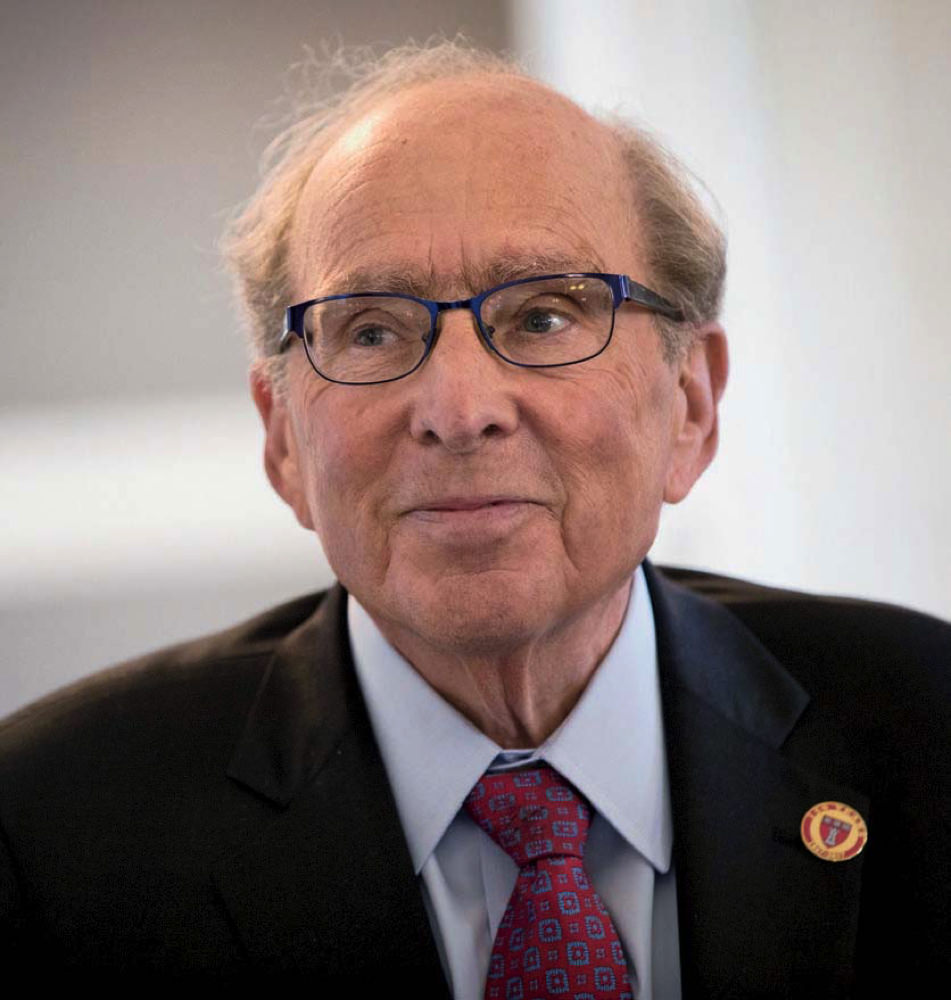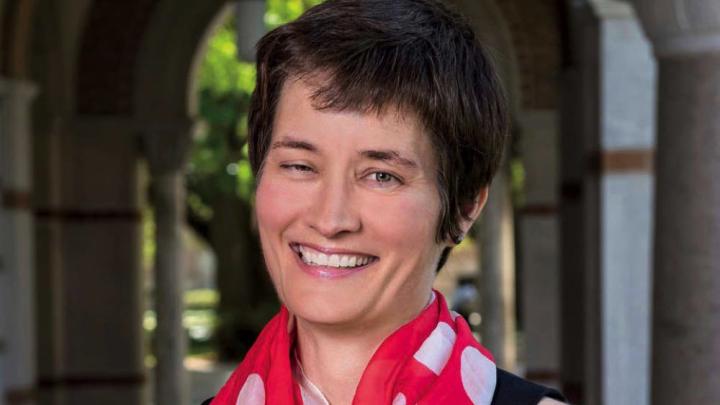Design Dean
Sarah Whiting, a Yale alumna who earned her master of architecture degree from Princeton and her Ph.D. from MIT—and was a design critic and assistant and associate professor at the Graduate School of Design at the turn of the millennium—returns as dean, effective July 1, succeeding Mohsen Mostafavi, who led the school for 11 years. Whiting, co-founder and partner of WW Architecture, had been dean at Rice University’s undergraduate and graduate School of Architecture since 2010. Campus planning will figure in her GSD deanship, as Gund Hall is expanded and reconfigured. Her twin brother, Alex Whiting, is a Law School professor of practice. Learn more here.
Speech, Interrupted
During a spring of heightened protests in favor of fossil-fuel divestment (among other causes), student advocates crossed a line on April 4 when they disrupted a Harvard Kennedy School (HKS) Institute of Politics event at which President Lawrence S. Bacow and Graduate School of Education dean Bridget Terry Long were scheduled to talk about universities and economic opportunity. The protesters took to the stage and declined HKS dean Douglas W. Elmendorf’s request that they move to the back so the audience could see the speakers. When they declined, Bacow lamented that this was the first time he knew of on campus when speakers were prevented from talking to their intended audience. The forum was relocated within the building, and continued. (Read a full report here.) In a subsequent essay in The Harvard Crimson (“What Kind of Community Do We Want to Be?”), Bacow—who established a record at Tufts as an absolute advocate for free speech, coupled with strong advocacy for vigorous speech to counter falsehoods or hateful speech—declared, “The heckler’s veto has no place at Harvard.”
Mental Health
Responding to increased student reports of mental-health issues and increased demand for related health services, the provost has created a Task Force on Managing Student Mental Health. Its members are Grafstein Family professor of sociology Mario Small, whose recent book, Someone To Talk To, investigates whom people turn to when they face difficulties; Graduate School of Arts and Sciences dean Emma Dench, who has expressed concern about students’ long, and often lonely and stressful, pursuit of their degrees; and Pierce professor of psychology Matthew K. Nock, who studies suicide and self-injury (see “A Tragedy and a Mystery,” January-February 2011, page 32).
Corporation News
On May 23, the University announced that James W. Breyer, M.B.A. ’87, a fellow of the Harvard Corporation since 2013, would conclude his service on June 30, after one six-year term; details appear here. Later that day, senior fellow William F. Lee gave a periodic briefing on the governing board’s work during President Bacow’s first year. Lee highlighted “good progress” on Allston development; promoting intellectual collaborations within Harvard and beyond; supporting Bacow’s efforts to advocate for higher education; ensuring sound management of the endowment; and sustaining core values, such as freedom of speech, within an increasingly diverse and more-inclusive community. Read a full report here.
Development Developments
Philip Ragon and Susan Ragon have given $200 million to Massachusetts General Hospital to support their eponymous vaccine-research institute (a venture of MGH, MIT, and Harvard), which focuses especially on HIV/AIDS, under the leadership of Ragon professor of medicine Bruce D. Walker. “People Who Don’t Get AIDS” (January-February) reported on his work.…Stanford has named its Wu Tsai Neurosciences Institute in honor of its alumna Clara Wu Tsai and her husband, Joseph Tsai, a Yale graduate and co-founder of Alibaba Group—the lead donors in an effort that has raised nearly $250 million for brain science.…P. Roy Vagelos, LL.D. ’03, a graduate of Penn (and a Columbia M.D.), who was chairman and CEO of Merck & Co., and Diana Vagelos have given $50 million to his alma mater, where he was chair of the board of trustees, to build a facility that will house Penn scholars’ work on energy science and engineering. The couple have previously funded eponymous research programs in the field.
Federal Force I
As the Trump administration and its secretary of education pursue opposition to the use of affirmative action in admissions (investigating Harvard and Yale, withdrawing Obama administration guidance on how to consider race legally in pursuit of diversity), Texas Tech University Health Sciences Center has agreed to stop considering race in applications to its medical school. It signed the agreement with the department of education in February, 14 years after affirmative-action opponent Roger Clegg filed a complaint against Texas Tech.
Federal Force II
In the wake of concerns expressed by national-security agencies, federal funders (including the important National Institutes of Health), the White House, and members of Congress about possible international exploitation of U.S. academic research (particularly such efforts emanating from China), a number of institutions took steps in recent months to clamp down on foreign researchers. Among reported incidents, NIH restricted or delayed Iranian scientists from making presentations; MIT has tightened collaborations with Chinese, Saudi, and Russian universities and researchers; and the University of Texas MD Anderson Cancer Center moved to dismiss three tenured scientists. In some cases, the affected parties have not disclosed their citizenship or international collaborations, as required. Combined with tighter student visas to study in the United States, the enforcement measures suggest a changing climate for research across borders.
First-Generation Students
First-Year Scholars at Yale—a residential academic immersion for entering undergraduates from first-to-college and low-income families (see “Mastering the ‘Hidden Curriculum,’” November-December 2017)—is expanding in enrollment and scope. Yale announced it would include 72 students this summer, an increase of 20 percent, and would augment the for-credit writing curriculum with a quantitative-reasoning course. Adding the latter requires the program to lengthen from five weeks to six. Those enrolled receive tuition, room, board, travel expenses, a living stipend, and a waiver of any summer-effort component of their financial-aid awards. Harvard unveiled its four-day pre-orientation First-Year Retreat and Experience offering last year (see this report).
What They Earned
The University’s annual tax filings, released in May and covering the fiscal year ended June 30, 2018, reveal that departing President Drew Faust had total compensation of $1,707,070, including $500,000 in deferred compensation awarded her by the Harvard Corporation and vesting in her final year. Provost Alan Garber earned $880,900 in total compensation, and Michael D. Smith, the former dean of the Faculty of Arts and Sciences, who stepped down last August, earned $730,382. At Harvard Management Company, which invests the endowment, president and CEO N.P. Narvekar earned $9,251,786 in total compensation, including $2.75 million in reimbursement for compensation forfeited when he left his former position as head of Columbia’s endowment. Compensation for other HMC investment professionals reflects in part changes in personnel since Narvekar assumed control, and in the overall compensation system he has since implemented. Complete details appear here.

R. Bruce Donoff
Photograph by Stephanie Mitchell/HPAC
Dental Dean
R. Bruce Donoff has announced the conclusion of his 28-year Harvard School of Dental Medicine deanship at the end of 2019. Announcing the news, President Lawrence S. Bacow conveyed this story: “Earlier this year, Harvard welcomed a Scholars at Risk Fellow who had been attacked and beaten in his home country because of his sexual orientation. The hate crime left him with broken front teeth and in dire need of reconstructive surgery. Bruce quickly and quietly led an effort to ensure that our colleague received the care he needed. It was a remarkable display of generosity—customary of the person of decency and integrity who I know Bruce to be.”
Nota Bene
Pulitzer plaudits. Eliza Griswold, NF ’07 and a 2016-17 Harvard Divinity School Berggruen Fellow, was awarded the Pulitzer Prize for General Nonfiction for her book Amity and Prosperity: One Family and the Fracturing of America. A Wall Street Journal team that won the national-reporting prize included Rebecca Davis O’Brien ’06, a former Harvard Magazine Berta Greenwald Ledecky Undergraduate Fellow. And Jeffrey Stewart won the biography prize for The New Negro, a life of Alain Locke (A.B. 1908, Ph.D. ’18)—both assessed in “Art and Activism” (March-April 2018). Details are available here.
Radcliffe fellows. The Radcliffe Institute has announced its 2019-2020 cohort of fellows, including 11 Harvard faculty members—among them Kemper professor of American history Jill Lepore and professor of history, race, and public policy Khalil Gibran Muhammad (see “Writing Crime into Race,” July-August 2018, page 57). A report, including information on all the fellows, appears here.
Ec 10 evolves. “Principles of Economics,” often the College’s most-enrolled course, is getting a makeover, as course leader N. Gregory Mankiw, Beren professor of economics, passes the reins this fall to Jason Furman, professor of the practice of economic policy (see “The New Monopoly,” March-April, page 11), and Goldman professor of economics David I. Laibson, the new faculty dean of Lowell House, a behavioral economist and former chair of the department (see this report). Their preliminary plans call for incorporating more real-world and applied contents, alongside the course’s traditional introduction to economic theory.
Leadership online. Harvard Kennedy School has introduced its “Public Leadership Credential,” a six-unit online program (two segments each in evidence for decisions, leadership and ethics, and policy design and delivery), leading to a credential and, for those so inclined, a possible pathway into the mid-career M.P.A. The credential broadens access to the school’s lecturers and expertise; opens new avenues for revenue; and, like Harvard Business School Online’s foundational offerings, can expand the pool of potential degree-seekers on campus.
Urbanism online. The Graduate School of Design’s “future of the American city” project—conducting research initially in Miami, on subjects ranging from transportation to adapting to climate change—has launched an e-resource (http://fotac.gsd.harvard.edu) to disseminate its findings.
Miscellany. The Arnold Arboretum has installed a solar array with 450 kilowatts of capacity, and associated storage, to provide up to 30 percent of the energy required to run its Weld Hill Research and Education Building.…Rothenberg professor of the humanities Homi K. Bhabha, director of the Mahindra Humanities Center since 2005, concluded his service as of July 1.…Harvard University Health Services announced that effective June 17, it will stop providing in-person overnight urgent care; calls for service made between 10:00 p.m. and 8:00 a.m. will be referred to a nurse advice line, a model it tested beginning last December.…Of the 1,950 successful applicants to the College class of 2023 (see Brevia, May-June, page 30), some 83 percent accepted—up 1.3 percentage points from last year; that high yield left only a few spaces open for applicants on the waiting list.…Loeb associate professor of engineering and applied sciences Jelani Nelson, an algorithm specialist whose University appointment was widely hailed (Harvard Portrait, May-June 2015, page 19), is departing for a professorship at the University of California, Berkeley.








